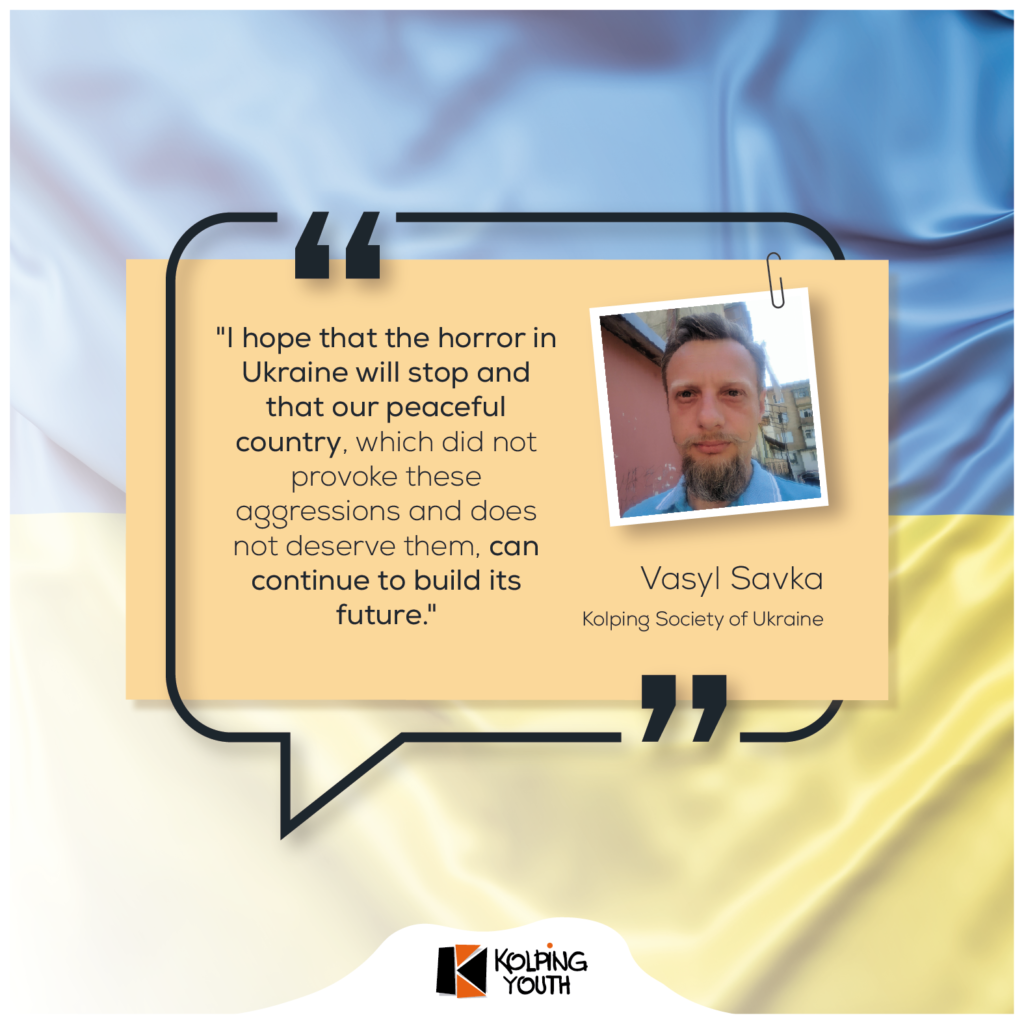
The Catholic radio station domradio.de has interviewed Vasyl Savka, Managing Director of the Kolping Society of Ukraine and President of our partner organization Kolping Europe. He is coordinating Kolping Ukraine’s support for citizens that had to flee from eastern Ukraine. The interview was conducted in German and translated into English by Kolping Youth Europe.
DOMRADIO.DE: What is the current situation at you?
Vasyl Savka: Here in Chernivtsi, where the headquarters of the Ukrainian Kolping Society is located, the situation is still more or less stable and calm, if I may say so in this time. Since the beginning of the war, only twice a siren was triggered because of an air raid and we – the citizens of Chernivtsi – had to go to the cellar.
Besides that, in the city life is going on more or less normal. However, due to the wartime there are curfews from 10 pm to 6 am. Of course, people are in stress, they are in an uncertainty because nobody can foresee what will happen next. And, of course, there is quite a lot of stress and fear among people.
DOMRADIO.DE: You care for many refugees. How are they doing?
Vasyl Savka: Russia’s invasion has resulted in more than half a million refugees that left Ukraine and at least 160,000 refugees within the country. In Chernivtsi, for example, more than 6,000 refugees have already arrived. This situation has created a deep crisis with regards to shelter and food.
Communities in all cities have mobilized very strongly and opened several points where refugees can get help. The citizens themselves collect food, clothes, bedding, all kinds of things and take care for these poor people who want to flee the war. The restaurants in Chernivtsi, for example, but also in other cities, feed refugees free of charge.
In different cities, places have been opened where refugees can get warm meals. We have a kitchen, where we can feed 50 to 100 people a day. In addition, the refugees receive other necessary things that are given to us by the municipality, by the government, and through donations and humanitarian aid from abroad.
DOMRADIO.DE: And where do the people come from?
Vasyl Savka: People come from different regions of the country: from Kyiv, from the east, from Kherson, from Mariupol. From all regions, where the war is now, where places are bombed, where rockets are launched, where shootings take place.
DOMRADIO.DE: What do you urgently need to help the refugees?
Vasyl Savka: Basically, everything is needed: warm clothes, quilts, diesel generators, food, power banks, batteries, flashlights – everything that can make life a little easier for the people here.
DOMRADIO.DE: And how can we support you? Is it the best to donate money to Kolping International?
Vasyl Savka: I have to say, the Kolping Societies all over Europe are so incredibly committed. They collect goods for humanitarian aid, coordinated by Kolping International in close collaboration with the Kolping Society of Ukraine. In addition, many Kolping brothers and sisters in all EU countries where Kolping exists have agreed to take in refugees from Ukraine. Kolping International has started a fundraising campaign to support Ukraine since the very beginning of the war. Thanks to this help, more people can get the support that is currently so important.
DOMRADIO.DE: How do you see the future? Will you also leave the country – perhaps even have to leave? Or will you stay?
Vasyl Savka: I definitely will stay in my country. I will defend my country as much as I can. However, I look to the future with hope. I hope that the civilized world will succeed in stopping Putin and his army. I hope that the horror in Ukraine will stop and that our peaceful country, which did not provoke these aggressions and does not deserve them, can continue to build its future. I will stay in Ukraine. I will defend my country. This is how I see the future.
More information about the Ukraine Emergency Aid of Kolping International is available here. We would appreciate if you decide to support Ukraine with a donation.
The interview was conducted by Katharina Geiger and published originally in German language on domradio.de. The text was translated into English by Dr. Sven Messing.